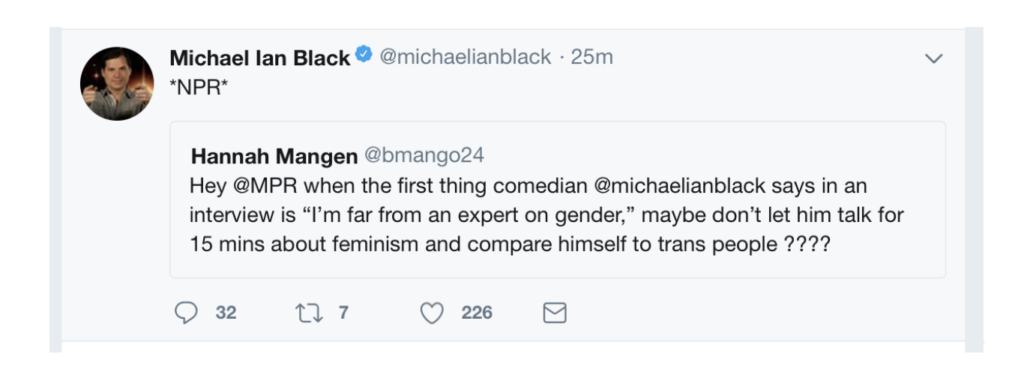

Gino Santa Maria / Shutterstock.com
Pressing Issues
Gino Santa Maria / Shutterstock.com
The Greitens Case Shows the Perils of Our News Cycle
When breaking a story matters more than respecting sources and subjects, journalists are not only failing, they’re putting women at risk.
This article was made possible because of the generous support of DAME members. We urgently need your help to keep publishing. Will you contribute just $5 a month to support our journalism?
Before Eric Greitens became governor of Missouri, the married father of two was carrying on an extramarital affair—the news of which broke a little over a month ago. Political sex scandals aren’t new, but this story took a dark turn: Nude photos and threats of blackmail were launched. It was no longer just some affair; it now entered possible criminal territory, with the governor’s former lover a potential victim.
In her 2015 book Asking for It: The Alarming Rise of Rape Culture and What We Can Do About It, author Kate Harding writes, “It doesn’t take a crack investigative reporter to locate suggested best practices for reporting on sexual violence.” Harding goes on to list a few websites: The Dart Center, Poynter, Chicago Task Force on Violence on Women and Girls. She qualifies that her list is only pulled from the first two pages of a “simple web search.” A long and nearly audible exhale, her message is clear: This shit isn’t hard.
But some at the St. Louis Post Dispatch still struggled with how to report the Greitens story in a way that recognized there may be a victim involved. At one point, I am told, as Post Dispatch reporters scrambled to put the story out there, a woman working on the piece yelled: Why in the fuck am I the only woman working on this story?
Certainly, in the wake of the 2016 presidential campaign, quasi mea culpas were offered by news organizations, the dereliction of the duty of the Fourth Estate to hold then-candidate Trump accountable. All those sexual-assault and harassment violations to choose from and not one national outlet saw fit to assign a team of reporters to any one of them for prolonged, thoughtful, enduring reporting. How could a possible survivor’s story wrest the attention of news outlets from Trumpian clickbait? I mean the guy was only running for president after all.
Then came the revival of Tarana Burke’s #MeToo Movement. It wasn’t just Hollywood’s bad actors being called out. The rot of sexual harassment and assault in news media finally came to the fore: Women have been speaking out about misconduct at NPR, NBC, VICE, the New York Times, and other outlets. This came as no surprise to those of us who have been working in the industry. Open secrets kept so our jobs, our gigs, our livelihoods could stay afloat.
Whether it’s coverage of campaigns, business, entertainment—sex scandals sell. If news reporters did their jobs ethically, diligently, and correctly, those so-called scandals ended with a resignation, reprimand, or even jail time. To this day, Trump is apparently not accountable for his alleged depravity—he’s still in office, not behind bars—while Hillary Clinton was held to an impossible standard of being accountable for everything her husband ever did or was rumored to have done.
Brock Turner, convicted of three counts of sexually assaulting an unconscious woman behind a dumpster on the Stanford University campus. Two cyclists caught him in the act and tackled him before he could run away. However, headline after headline referred to the then-alleged rapist as a “Stanford swimmer” and papers lauded his promising swim times right alongside the horrific details of the assault. A woman reduced to the measure of Turner’s promise as a once-Olympic hopeful.
However it is politicians who dominate the news and despite all the mea culpas of 2016, the news media, with some exceptions, is still getting coverage of sexual assault, sexual misconduct, and other so-called scandals all wrong. Governor Eric Greitens is a perfect example.
Nestled in Eric Greitens’s crotch is a locked-and-loaded .50-caliber machine gun. Greitens starts squeezing a spray of rounds. It is a political ad called “Big Guns” which would propel Greitens to the Missouri governor’s mansion. The voiceover is standard 2016 GOP: Take back everything from Obama and his “Democrat machine.” Here’s a “family man” who will bring back family values to the show-me state. And we see Greitens looking like a kid fresh off his first ride on a roller-coaster. He is practically giddy with power.
Following his victory, he was touted as a rising star of the GOP—presidential-candidate material, even, for 2024.
But last month, a St. Louis TV station broke the story that Greitens had an ongoing extramarital affair in 2015. The story featured a sit-down interview with the cuckolded husband, his face blurred to insure anonymity.
In the news segment, the ex-husband provided the TV news reporter with audio of his and his then-wife’s conversation in which she reveals the affair. What was he doing taping their conversation without her knowledge is unclear and jarring, but not as jarring as the content reported, especially this:
Greitens, she said, taped her hands to the exercise bar, blindfolded her, pulled down her pants, took a photo of her (she could see the flash through the fiber of the blindfold) and laid down a threat: If she mentioned his name, the naked picture would be everywhere. The woman declined to comment on the record to the television station.
Why that bit? Because throughout the whole story of a consensual affair, this rises to the level of possibly criminal behavior on the part of the governor. Initially, it wasn’t really taken too seriously by the media, which reported the consensual part of the affair missing biggest point: Greitens allegedly photographed the woman, partially naked, without consent apparently to blackmail her into silence.
A Missouri-based reporter friend and I discussed the story. It was, like so many “scandals,” an open secret in Missouri. We’d been talking about it for the entire span of Greitens’s term as governor, in fact. Although he and his paper had the opportunity to break the story, my friend chose not to. He couldn’t get the woman, a possible victim, to comment or even talk to him so they waited until another outlet ran with it (because they knew it was coming out). Then, he and the team he works with were able to dig into that key bit I pulled out—the blackmail part, where Greitens allegedly took a picture of a partially naked woman without her consent.
Last week a St. Louis grand jury agreed and indicted Greitens on felony invasion of privacy charges, the Missouri GOP has asked him to quit and the state legislature is officially investigating his conduct.
On the opposite side of the spectrum, we now have the woke dude bros slapping themselves on the back when they realize “Holy shit! Men have indeed been terrible in [insert instance here].” A recent example: Michael Ian Black.
The other day Black seemed to be struck by a knowledge lightning bolt: Men are the problem when it comes to gun violence! So NPR invited him on to discuss this new thing that literally every woman journalist has been reporting on since forever. He took to Twitter to thank NPR for having him on:
Thank you for having me on. I was very nervous to talk about this stuff and you were very kind. https://t.co/RhzXsaLVUG
— Michael Ian Black (@michaelianblack) February 18, 2018
How encouraging! Black himself isn’t part of the news media but NPR having a white guy on to talk about his realization that there is something going on with “American men” that gives them permission “and space to commit violence.” Most women covering gender-based violence have been reporting the link of toxic masculinity and violence for ages. However, it is still important for members of the oppressive class to come forward and say, “I am a member of this group that is broken.” Sadly, Black’s newfound wokeness was fleeting.
About 30 minutes or so after tweeting a big thanks to NPR came this:

Yes, Michael Ian Black mansplained and shamed in one tweet a woman who was calling out her local Minnesota Public Radio – which is why she indicated “MPR” for having Black on in the first place (her points are all good ones).
Michael you were so close—but you had to let that woman know she was wrong (she wasn’t) because you were right (you weren’t).
Black’s seemingly harmless reaction is part of that whole toxic masculinity thing: man gets schooled, man feels embarrassed perhaps even angry, man lashes out at the woman. The woman’s punishment is doled out; some like Black lash out in snotty Twitter retorts, others escalate to Gamergate, the sustained, systemic harassment campaign, others to sexual assault and domestic violence. Michael Ian Black is innocuous, his Twitter-fit rich with irony. The problem is the news media’s run to embrace his a-ha moment. It is a familiar pattern: white male celebrity says something, outlets latch on and report all about it. The predictably The New York Times has Black write an Op-Ed all about his awakening titled “The Boys Aren’t Alright.”
You can say that again.
So what is the solution? A world without men? God, I hope not. An easy step is to hire women reporters and editors. The Greitens story is a good example of why women decision-makers in newsrooms are critical.
Two years ago, the Post-Dispatch ran a story that outed a possible victim of sexual assault. The woman, a private citizen, had reported the incident to the police, had a SANE (Sexual Assault Nurse Examiner) exam—she did everything right. The story ran on the front page, top of the fold, with her photo. The woman hadn’t consented to her name or image being used. So why did they run the story? Because, it seems, she once had an affair with a man who had been powerful in political circles. That justification was met with local and national pushback from media critics to journalism schools.
So what kept the Post-Dispatch from running afoul of journalistic ethics to say nothing of possibly outing another victim in the Greitens story? I asked a trusted Missouri-based source, who told me “the most senior female editor and a female political beat writer” stepped in to stop the story running prematurely. Women saved the day by not sacrificing journalistic ethics and a possible victim on the altar of the almighty click.
Before you go, we hope you’ll consider supporting DAME’s journalism.
Today, just tiny number of corporations and billionaire owners are in control the news we watch and read. That influence shapes our culture and our understanding of the world. But at DAME, we serve as a counterbalance by doing things differently. We’re reader funded, which means our only agenda is to serve our readers. No both sides, no false equivalencies, no billionaire interests. Just our mission to publish the information and reporting that help you navigate the most complex issues we face.
But to keep publishing, stay independent and paywall free for all, we urgently need more support. During our Spring Membership drive, we hope you’ll join the community helping to build a more equitable media landscape with a monthly membership of just $5.00 per month or one-time gift in any amount.




















































































